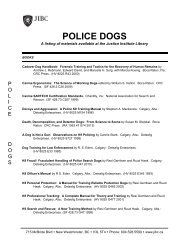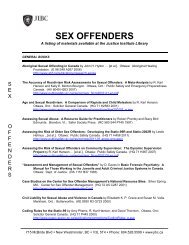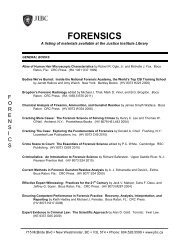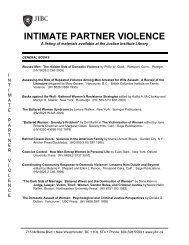legally speaking - Justice Institute of British Columbia
legally speaking - Justice Institute of British Columbia
legally speaking - Justice Institute of British Columbia
You also want an ePaper? Increase the reach of your titles
YUMPU automatically turns print PDFs into web optimized ePapers that Google loves.
[accused] in the house to the illegal drug<br />
activity. It would not have taken much more but<br />
the arresting <strong>of</strong>ficer chose to continue the<br />
investigation with the [accused] under arrest,<br />
rather than in less intrusive and restrictive<br />
investigative detention. In so doing, he effected<br />
an unlawful arrest in breach <strong>of</strong> the [accused’s]<br />
rights under s. 9 <strong>of</strong> the Charter. [para. 14]<br />
As for the trial judge’s s. 24(2) analysis, the Court <strong>of</strong><br />
Appeal was satisfied she weighed the appropriate<br />
factors in excluding the evidence. The Crown’s<br />
appeal was dismissed.<br />
Complete case available at www.courts.gov.bc.ca<br />
ARREST DOES NOT REQUIRE<br />
PRIMA FACIE CASE FOR<br />
CONVICTION<br />
R. v. Ash, 2010 BCCA 470<br />
The accused was stopped by police<br />
for failing to wear a seat-belt, an<br />
<strong>of</strong>fence under <strong>British</strong> <strong>Columbia</strong>’s<br />
Motor Vehicle Act. The <strong>of</strong>ficer noticed<br />
a jar in plain view on the front seat<br />
console which contained a liquid he believed was<br />
“hash oil” (cannabis resin oil). He continued dealing<br />
with the seat-belt infraction. When he returned to<br />
the vehicle the container was gone. The <strong>of</strong>ficer then<br />
asked the accused to exit the vehicle whereupon he<br />
was arrested for possessing a controlled substance. A<br />
search <strong>of</strong> the vehicle incidental to the arrest<br />
uncovered drugs, a knife, bear spray, a baton and a<br />
significant amount <strong>of</strong> money. He was charged with<br />
drug and weapons <strong>of</strong>fences.<br />
At trial in <strong>British</strong> <strong>Columbia</strong> Supreme Court the<br />
accused challenged the admissibility <strong>of</strong> the items<br />
found in his car on the basis that there were no<br />
reasonable grounds for the<br />
arrest and the search<br />
violated his rights under s.<br />
8 <strong>of</strong> the Charter. The trial<br />
judge concluded that the<br />
arrest was lawful and<br />
admitted the evidence. The<br />
accused was convicted <strong>of</strong><br />
Volume 11 Issue 1 - January/February 2011<br />
PAGE 8<br />
several <strong>of</strong>fences.<br />
“The issue is not whether the Crown<br />
would be able to prove possession,<br />
but whether the <strong>of</strong>ficer had<br />
reasonable and probable grounds<br />
for believing he did so.”<br />
The accused then appealed, submitting that the<br />
arrest was not reasonable. In his view, the <strong>of</strong>ficer did<br />
not have a subjective belief that he was in<br />
possession <strong>of</strong> the hash oil. Further, he contended<br />
that the trial judge failed to apply the proper test for<br />
assessing the grounds <strong>of</strong> arrest by conflating the<br />
subjective belief <strong>of</strong> the police <strong>of</strong>ficer with the<br />
required objective standard.<br />
<strong>Justice</strong> Chiasson, <strong>speaking</strong> for the unanimous Court<br />
<strong>of</strong> Appeal, first noted that s. 495(1)(a) <strong>of</strong> the Criminal<br />
Code “authorizes a peace <strong>of</strong>ficer to arrest without a<br />
warrant when on reasonable grounds he or she<br />
believes an indictable <strong>of</strong>fence has been committed<br />
or is about to be committed.” This provision requires<br />
the arresting <strong>of</strong>ficer to subjectively have reasonable<br />
grounds upon which to base the arrest. As well,<br />
those grounds must be justifiable from an objective<br />
point <strong>of</strong> view - a reasonable person placed in the<br />
position <strong>of</strong> the <strong>of</strong>ficer must be able to conclude that<br />
there were indeed reasonable grounds for the arrest.<br />
The police are not, however, required to<br />
demonstrate anything more than reasonable<br />
grounds. A prima facie case for conviction is not<br />
needed before making an arrest.<br />
In this case, it was apparent to the <strong>of</strong>ficer that the<br />
accused was the owner and driver <strong>of</strong> the vehicle and<br />
the hash oil container was in the front seat console<br />
beside him. The <strong>of</strong>ficer testified that he found the<br />
accused in possession <strong>of</strong> the hash oil. It was clear<br />
that the <strong>of</strong>ficer reasonably believed the accused was<br />
in possession <strong>of</strong> the drug. “The issue is not whether<br />
the Crown would be able to prove possession,” said<br />
<strong>Justice</strong> Chiasson, “but whether the <strong>of</strong>ficer had<br />
reasonable and probable grounds for believing he<br />
did so.” The Court <strong>of</strong> Appeal held that the <strong>of</strong>ficer’s<br />
subjective belief was also objectively reasonable.<br />
The Court rejected the accused’s assertion that the<br />
reasonableness <strong>of</strong> the <strong>of</strong>ficer’s<br />
belief was to be assessed from the<br />
point <strong>of</strong> view <strong>of</strong> a neutral arbiter<br />
free <strong>of</strong> the predilections and biases<br />
<strong>of</strong> police. Instead, the proper<br />
approach is to view the grounds<br />
from the point <strong>of</strong> view <strong>of</strong> a<br />
reasonable police <strong>of</strong>ficer in the






